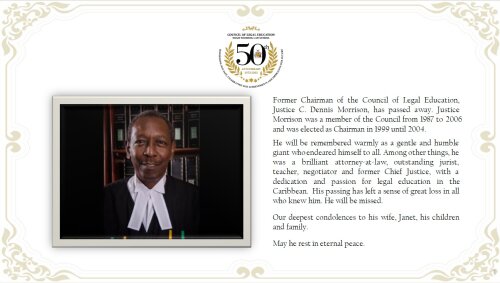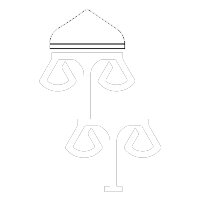Best Constitutional Law Lawyers in Port of Spain
Share your needs with us, get contacted by law firms.
Free. Takes 2 min.
List of the best lawyers in Port of Spain, Trinidad and Tobago
About Constitutional Law Law in Port of Spain, Trinidad and Tobago:
Constitutional Law in Port of Spain, Trinidad and Tobago, refers to the body of laws that govern the structure and functions of the government, the rights and duties of individuals, and the relationship between the government and its citizens as enshrined in the Constitution of Trinidad and Tobago. The Constitution is the supreme law of the land and provides the framework for the legal system in the country.
Why You May Need a Lawyer:
There are various situations where you may require legal assistance in Constitutional Law, such as challenging the constitutionality of a law or government action, seeking redress for violations of your constitutional rights, or addressing disputes related to constitutional matters. A lawyer specializing in Constitutional Law can provide you with expert advice and representation to navigate these complex legal issues.
Local Laws Overview:
Key aspects of local laws relevant to Constitutional Law in Port of Spain, Trinidad and Tobago, include the Constitution of Trinidad and Tobago, the Interpretation Act, and various statutes and regulations that govern specific constitutional provisions. The courts play a vital role in interpreting the Constitution and upholding the rule of law in the country.
Frequently Asked Questions:
1. What is the Constitution of Trinidad and Tobago?
The Constitution of Trinidad and Tobago is the supreme law of the country, outlining the structure of government, the rights and freedoms of individuals, and the procedures for governance.
2. How can I challenge the constitutionality of a law?
You can challenge the constitutionality of a law by filing a constitutional motion in the High Court or Court of Appeal, alleging that the law infringes on your constitutional rights.
3. What are fundamental rights under the Constitution?
Fundamental rights are constitutional rights that are guaranteed to every citizen, such as the right to life, liberty, and equality before the law.
4. Can the government limit my constitutional rights?
Yes, the government can limit constitutional rights in certain circumstances, such as national security or public order, but these limitations must be reasonable and justifiable in a democratic society.
5. How do I know if my constitutional rights have been violated?
If you believe that your constitutional rights have been violated, you should seek legal advice from a Constitutional Law lawyer to evaluate your situation and determine the appropriate course of action.
6. What is the role of the Judiciary in upholding the Constitution?
The Judiciary plays a crucial role in interpreting the Constitution, resolving disputes related to constitutional matters, and ensuring that the government acts within the bounds of the law.
7. Can I file a lawsuit against the government for violating my constitutional rights?
Yes, you can file a lawsuit against the government for violating your constitutional rights through a constitutional motion or other legal proceedings in the courts.
8. How long does it take to resolve a constitutional matter in court?
The timeline for resolving a constitutional matter in court can vary depending on the complexity of the case, but it generally takes time to gather evidence, argue legal issues, and await a judgment from the court.
9. What is the difference between constitutional law and administrative law?
Constitutional law governs the structure and functions of government and the rights of individuals, while administrative law focuses on the actions of government agencies and officials in implementing laws and policies.
10. How can I find a reliable Constitutional Law lawyer in Port of Spain?
You can find a reliable Constitutional Law lawyer in Port of Spain by asking for recommendations from friends or colleagues, researching online legal directories, or contacting the Law Association of Trinidad and Tobago for referrals to qualified lawyers.
Additional Resources:
For additional resources on Constitutional Law in Port of Spain, Trinidad and Tobago, you can visit the website of the Law Association of Trinidad and Tobago or seek information from the Judiciary of Trinidad and Tobago, which provides access to court decisions and legal resources.
Next Steps:
If you require legal assistance in Constitutional Law in Port of Spain, Trinidad and Tobago, contact a reputable Constitutional Law lawyer to discuss your case, evaluate your options, and receive personalized legal advice to protect your rights and interests.
Lawzana helps you find the best lawyers and law firms in Port of Spain through a curated and pre-screened list of qualified legal professionals. Our platform offers rankings and detailed profiles of attorneys and law firms, allowing you to compare based on practice areas, including Constitutional Law, experience, and client feedback.
Each profile includes a description of the firm's areas of practice, client reviews, team members and partners, year of establishment, spoken languages, office locations, contact information, social media presence, and any published articles or resources. Most firms on our platform speak English and are experienced in both local and international legal matters.
Get a quote from top-rated law firms in Port of Spain, Trinidad and Tobago — quickly, securely, and without unnecessary hassle.
Disclaimer:
The information provided on this page is for general informational purposes only and does not constitute legal advice. While we strive to ensure the accuracy and relevance of the content, legal information may change over time, and interpretations of the law can vary. You should always consult with a qualified legal professional for advice specific to your situation.
We disclaim all liability for actions taken or not taken based on the content of this page. If you believe any information is incorrect or outdated, please contact us, and we will review and update it where appropriate.













